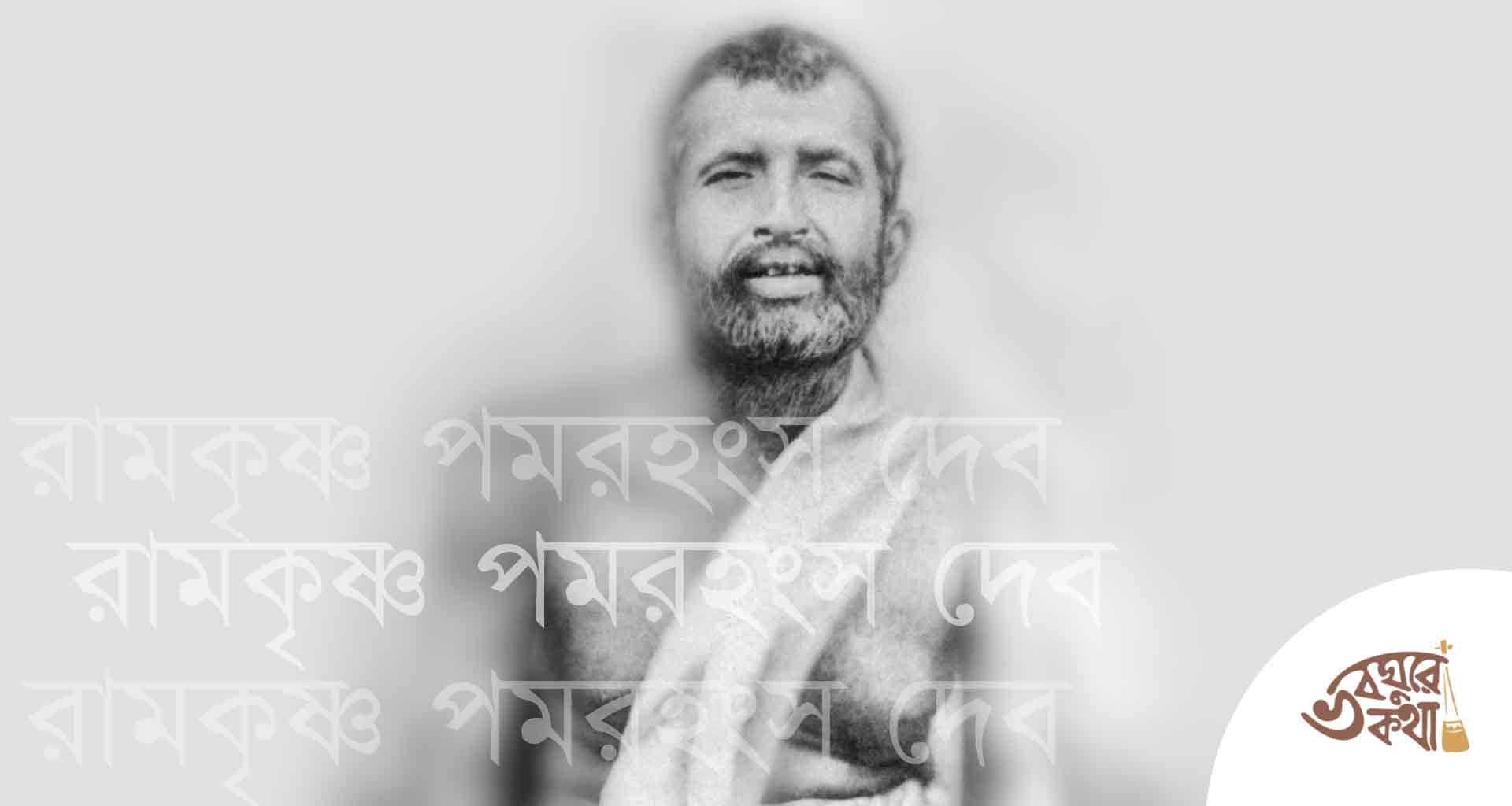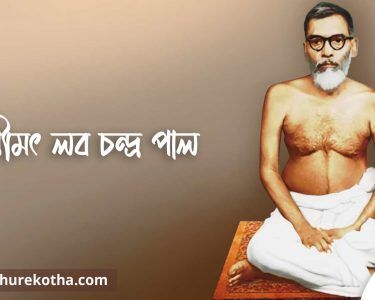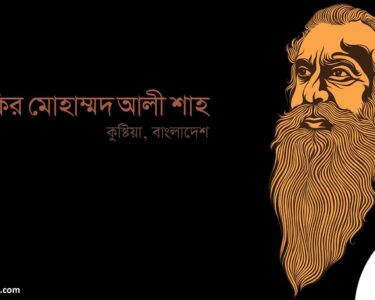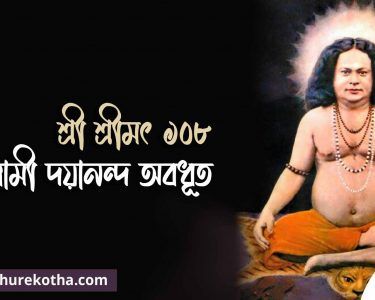শ্রীরামকৃষ্ণ, স্বামী বিবেকানন্দ ও অবতারবাদ
একদিন দক্ষিণেশ্বর-মন্দিরে ঠাকুর শ্রীরামকৃষ্ণ বাবুরাম প্রভৃতি ভক্তদের সঙ্গে বসিয়া আছেন, ১৮৮৫ খ্রীষ্টাব্দ, ৭ই মার্চ, বেলা ৩টা-৪টা হইবে।
ভক্তেরা পদসেবা করিতেছেন, – শ্রীরামকৃষ্ণ একটু হাসিয়া ভক্তদের বলিতেছেন, “এর (অর্থাৎ পদসেবার) অনেক মানে আছে।” আবার নিজের হৃদয়ে হাত রাখিয়া বলিতেছেন, “এর ভিতর যদি কিছু থাকে (পদসেবা করলে) অজ্ঞান অবিদ্যা একেবারে চলে যাবে।”
হঠাৎ শ্রীরামকৃষ্ণ গম্ভীর হইলেন, যেন কি গুহ্যকথা বলিবেন। ভক্তদের বলিতেছেন, “এখানে বাহিরের লোক কেউ নাই, তোমাদের একটা গুহ্যকথা বলছি। সেদিন দেখলাম, আমার ভিতর থেকে সচ্চিদানন্দ বাইরে এসে রূপ ধারণ করে বললে, আমিই যুগে যুগে অবতার। দেখলাম পূর্ণ আর্বিভাব, তবে সত্ত্বগুণের ঐশ্বর্য।”
ভক্তেরা এই সকল কথা অবাক্ হইয়া শুনিতেছেন। কেহ কেহ গীতোক্ত ভগবান শ্রীকৃষ্ণের মহাবাক্য স্মরণ করিতেছেন –
যদা যদা হি ধর্মস্য গ্লানির্ভবতি ভারত।
অভুত্থানমধর্মস্য তদাত্মানং সৃজাম্যহম্ ৷৷
পরিত্রাণায় সাধূনাং বিনাশায় চ দুষ্কৃতাম্
ধর্মসংস্থাপনার্থায় সম্ভবামি যুগে যুগে ৷৷
আর-একদিন ১৮৮৫ খ্রীষ্টাব্দ, ১লা সেপ্টেম্বর জন্মাষ্টমী দিবসে নরেন্দ্রাদি ভক্তের সমাগম হইয়াছে। শ্রীযুক্ত গিরিশ ঘোষ ২।১টি বন্ধু সঙ্গে করিয়া দক্ষিণেশ্বরে গাড়ি করিয়া আসিয়া উপস্থিত। কাঁদিতে কাঁদিতে আসিতেছেন। শ্রীরামকৃষ্ণ সস্নেহে তাঁহার গা চাপড়াইতে লাগিলেন।
গিরিশ মাথা তুলিয়া হাতজোড় করিয়া বলিতেছেন – “তুমিই পূর্ণব্রহ্ম। তা যদি না হয়, সবই মিথ্যা। বড় খেদ রইলো তোমার সেবা করতে পেলুম না। দাও বর ভগবন, একবৎসর তোমার সেবা করব।” বারবার তাঁহাকে ঈশ্বর বলিয়া স্তব করাতে ঠাকুর বলিতেছেন, – “ছি, ও-কথা বলতে নাই, ভক্তবৎ ন চ কৃষ্ণবৎ। তুমি যা ভাব, তুমি ভাবতে পার। আপনার গুরু তো ভগবান, তা বলে ও-সব কথা বলায় অপরাধ হয়।”
গিরিশ ঠাকুরকে আবার স্তব করিতেছেন, “ভগবন্, পবিত্রতা আমায় দাও; যাতে কখনও একটু পাপচিন্তা না হয়।”
শ্রীরামকৃষ্ণ – তুমি পবিত্র তো আছ – তোমার যে বিশ্বাস ভক্তি!
একদিন ১লা মার্চ, ১৮৮৫ খ্রীষ্টাব্দ, দোলযাত্রা দিবসে নরেন্দ্রাদি ভক্তগণ আসিয়াছেন। ওইদিন ঠাকুর নরেন্দ্রকে সন্ন্যাসের উপদেশ দিতেছেন ও বলিতেছেন, “বাবা, কামিনী-কাঞ্চনত্যাগ না হলে হবে না। ঈশ্বরই একমাত্র সত্য, আর সব অনিত্য।” বলিতে বলিতে ভাবপূর্ণ হইয়া উঠিলেন। সেই করুণামাখা সস্নেহদৃষ্টি।
ভাবোন্মত্ত হইয়া গান ধরিলেন:
কথা বলতে ডরাই, না বললেও ডরাই,
মনে সন্দ হয়, পাছে তোমা ধনে হারাই – হারাই।
আমরা জানি যে মন্তোর দিলাম তোকে সেই মন্তোর,
এখন মন তোর!
আমরা যে মন্ত্রে বিপদেতে তরি তরাই।
শ্রীরামকৃষ্ণের যেন ভয়, বুঝি নরেন্দ্র আর কাহার হইল, আমার বুঝি হল না – ভয় পাছে নরেন্দ্র সংসারের হয়েন। “আমরা জানি যে মন্ত্র, দিলাম তোরে সেই মন্ত্র”, অর্থাৎ আমি তোকে জীবনের Highest Ideal সর্বত্যাগ করে ঈশ্বরের শরণাগত হওয়া এই মন্ত্র দিলাম। নরেন্দ্র অশ্রুপূর্ণ লোচনে চাহিয়া আছেন।
ওইদিনই ঠাকুর নরেন্দ্রকে বলিতেছেন, “গিরিশ ঘোষ যা বলে, তোর সঙ্গে কি মিললো?”
নরেন্দ্র – আমি কিছু বলি নাই, তিনিই বলেন তাঁর অবতার বলে বিশ্বাস। আমি আর কিছু বললুম না।
শ্রীরামকৃষ্ণ – কিন্তু খুব বিশ্বাস! দেখেছিস?
কিছুদিন পরে নরেন্দ্রের সঙ্গে ঠাকুরের অবতার বিষয়ের কথা হইল। ঠাকুর বলিতেছেন, ‘আচ্ছা, কেউ কেউ যে আমাকে ঈশ্বরের অবতার বলে, তোর কি বোধ হয়?”
নরেন্দ্র বললেন, “অন্যের মত শুনে আমি কিছু করব না; আমি নিজে যখন বুঝব, নিজের যখন বিশ্বাস হবে, তখনই বলব।”
কাশীপুর উদ্যানে ঠাকুর যখন ক্যানসার রোগে যন্ত্রণায় অস্থির হইয়াছেন, ভাতের তরল মণ্ড পর্যন্ত গলাধঃকরণ হইতেছে না, তখন একদিন নরেন্দ্র ঠাকুরের নিকট বসিয়া ভাবিতেছেন, এই যন্ত্রণামধ্যে যদি বলেন যে, আমি সেই ঈশ্বরের অবতার তাহলে বিশ্বাস হয়। চকিতের মধ্যে ঠাকুর বলিতেছেন – “যে রাম যে কৃষ্ণ, ইদানিং সে-ই রামকৃষ্ণরূপে ভক্তের জন্য অবতীর্ণ হয়েছে।” নরেন্দ্র এই কথা শুনিয়া অবাক্ হইয়া রহিলেন। ঠাকুর স্বধামে গমন করিলে পর নরেন্দ্র সন্ন্যাসী হইয়া অনেক সাধন-ভজন-তপস্যা করিলেন। তযন তাঁহার হৃদয়মধ্যে অবতার সম্বন্ধে ঠাকুরের মহাবাক্য সকল যেন আরও প্রস্ফুটিত হইল। তিনি স্বদেশে-বিদেশে এই তত্ত্ব আরও পরিষ্কাররূপে বুঝাইতে লাগিলেন।
স্বামীজী যখন আমেরিকায় ছিলেন, তখন নারদসূত্রাদি গ্রন্থ অবলম্বন করিয়া ভক্তিযোগ নামক গ্রন্থ ইংরেজীতে প্রণয়ন করেন। তাহাতেও বলিতেছেন যে, অবতারগণ স্পর্শ করিয়া লোকের চৈতন্য সম্পাদন করেন। তাঁহাদের স্পর্শে যাহারা দুরাচার, তাঁহারা পরম সাধু হইয়া যায়েন। “অপি চেৎ সুদুরাচারো ভজতে মামনন্যভাক্ সাধুরেব স মন্তব্যঃ সম্যক্ ব্যবসিতো হি সঃ।” ঈশ্বরই অবতাররূপে আমাদের কাছে আইসেন। যদি ঈশ্বরদর্শন করিতে আমরা চাই, তাহা হইলে অবতারপুরুষের মধ্যেই তাঁহাকে দর্শন করিব। তাঁহাদিগকে আমরা পূজা না করিয়া থাকিতে পারিব না।
“Higher and nobler than all ordinary ones, is another set of teachers, the Avataras of Ishvara, in the world. They can transmit spirituality with a touch, even with a mere wish. The lowest and the most degraded characters become in one second saints at their command. They are the Teachers of all teachers, the highest manifestations of God through man. We cannot see God except through them. We cannot help worshipping them; and indeed they are the only ones whom we are bound to worship.” -Bhakti Yoga
আবার বলিতেছেন, – যতক্ষণ আমাদের মনুষ্যদেহ, ততক্ষণ আমরা ঈশ্বরের যদি পূজা করি, তবে একমাত্র অবতারপুরুষকেই করিতে হইবে। হাজার লম্বা লম্বা কথা কও, ঈশ্বরকে মনুষ্যরূপ ব্যতীত আর চিন্তাই হয় না। তোমার ক্ষুদ্র বুদ্ধি দ্বারা ঈশ্বরের স্বরূপ আবোল-তাবোল কি বলিতে চাও? যাহা বলিবে, তাহার কিছুই মূল্য নাই। mere froth!
“As long as we are men, we must worship Him in man and as man. Talk as you may, you cannot think of God except as a man. You may deliver great intellectual discourses on God and on all things under the Sun, become great rationalists and prove to your satisfaction that all these accounts of the Avataras of God as man are nonsense. But let us come for a moment to practical commonsense. What is there behind this kind of remarkable intellect? Zero, nothing, simply so much forth. When next you hear a man delivering a great intellectual lecture against this worship of the Avataras of God, get hold of him and ask him what his idea of God is, what he inderstands by ‘Omnipotence’. ‘Omnipotence’ and all similar terms beyond the spellingof the words. He really means nothing by them; he cannot formulate as their meaning any idea unaffected by his own human nature; he is no better off in this matter than the man in the street who has not read a single book.” –
Bhakti-Yoga.
স্বামী দ্বিতীয়বার আমেরিকায় গমন করিয়াছিলেন ১৮৯৯ খ্রীষ্টাব্দে। সেই সময়ে ১৯০০ খ্রীষ্টাব্দে California প্রদেশে Los Angeles নামক নগরে Christ the Messenger বিষয়ে একটি বক্তৃতা দিয়াছিলেন। এই বক্তৃতায় আবার অবতারতত্ত্ব বিষদভাবে বুঝাইতে চেষ্টা করিয়াছিলেন। স্বামী বলিলেন, অবতার পুরুষেতেই (in the Son) ঈশ্বরকে দেখিতে হইবে। আমাদের ভিতরেও ঈশ্বর আছেন বটে, কিন্তু অবতারপুরুষেই তিনি বেশি প্রকাশ। আলোর স্পন্দন (Vibration of Light) সর্বস্থানে হইতেছে, কিন্তু বড় বড় দীপ জ্বালিলেই অন্ধকার দূর হয়।
“It has been said by the same Messenger (Christ) ‘None hath seen God, but they have seen the Son.’ And that is true. And where to see God but in the Son? It is true that you and I, the poorest of us, the meanest even, embody that God – even reflect that God. The vibration of light is everywhere, omnipresent; but we have to strike the light of the lamp there and then we human beings see that He is Omnipresent. The Omnipresent God of the Universe cannot be seen until He is reflected by these giant lamps of the earth; the Prophets, the Man-Gods, the Incarnations, the embodiments of God.” – Christ the Messenger.
স্বামী আবার বলিতেছেন – ঈশ্বরের স্বরূপ তুমি যতদূর পার কল্পনা করিতে পার; কিন্তু দেখিবে, তোমার কল্পিত ঈশ্বর, অবতারপুরুষ অপেক্ষা অনেক নিচু। তবে এই মানুষ দেবতাগুলিকে পূজা করা কি অন্যায়? তাঁহাদের পূজা করাতে কোন দোষ নাই। শুধু তাহা নহে, ঈশ্বরকে পূজা করিতে হইলে অবতারকেই পূজা করিতে হইবে। তুমি যে মানুষ, তোমার মানুষরূপী ভগবানকে পূজা করিতে হইবে, অন্য উপায় নাই।
“Take one of these Messengers of light, compare his character with highest ideal of God you ever formed, and you find that your God falls low and that that character rises. You cannot even form of God a higher ideal than what he actually embodied have practically realised and laid before us as an example. Is it wrong, therefore, to worship these as God? Is it a sin to fall at the feet of these man-Gods and worship them as the only Divine beings in the world? If they are really, actually, higher than all my conceptions of God, what harm that they should be worshipped? Not only is there no harm, but it is the only possible and positive way of worship.” -Christ the Messenger.
[অবতারের লক্ষণ (Jesus Christ) ]
অবতারপুরুষ কি বলিতে আইসেন? ঠাকুর শ্রীরামকৃষ্ণ নরেন্দ্রকে বলিয়াছিলেন, বাবা, কামিনী-কাঞ্চন ত্যাগ না করলে হবে না, ঈশ্বরই বস্তু আর সব অবস্তু। স্বামীজীও আমেরিকানদের বলিলেন –
“We see in the life of Christ the first watchword, ‘Not this life, but something higher!’ No faith in this world and all its belongings! It is evanescent; it goes!”
“যীশু কামিনী-কাঞ্চনত্যাগী। তিনি জেনেছিলেন, আত্মা স্ত্রীও নয়, পুরুষও নয়। টাকা-কড়ি, মান-সম্ভ্রম, দেহসুখ, ইনিদ্রয়সুখ অবতারপুরুষ কিছুই চান না। তাঁহার পক্ষে ‘আমি’ ‘আমার’ কিছুই নাই। আমি কর্তা, আমার গৃহ, পরিবার ইত্যাদি সব অজ্ঞান থেকে হয়।”
“We still have fondness for ‘me’ and ‘mine’. We want property, money, wealth. Woe unto us! Let us confess! And do not put to shame that great Teacher of humanity! He (Jesus) had no family ties. Do you think that that man had any physical ideas in him? Do you think that this mass of Light, this God and Not-man, came down so low, as to be the brother of animals? ANd yet, they make him preach all sorts, even of low sexual things. He had none! He was a soul! Nothing but a soul, just working, as it were, a body for the good of humanity; and that was all his relation to the body. Oh, not that! In the soul there is neither man nor woman. No, no! The disembodied soul has no relationship to the animal, no relationship to the body. The ideal may be high; away beyond us. never mind; It is the Ideal. Let us confess it is so: – that we cannot approach it yet.”
-Christ the Messenger.
আমেরিকানদের আবার বলিতেছেন – অবতারপুরুষ আর কি বলেন? আমাকে দেখিতেছ আর ঈশ্বরকে দেখিতে পাইতেছ না? তিনি আর আমি যে এক। তিনি যে হৃদয়মধ্যে শুদ্ধ মনের গোচর।
“Thou hast seen me and not seen the Father? I and my Father are one! The kingdom of Heaven is within you! If I am pure enough I will also find in the heart of my heart, I and my Father are one. That was what Jesus of Nazareth said.” -Christ the Messenger.
এই বক্তৃতামধ্যে স্বামী অন্যস্থলে বলিতেছেন, অবতারপুরুষ ধর্মসংস্থাপনের জন্য যুগে যুগে দেহধারণ করেন। যীসাস্ ক্রাইষ্টের ন্যায় দেশকালভেদে তাঁহারা অবতীর্ণ হয়েন। তাঁহারা মনে করিলে আমাদের পাপ মার্জনা ও মুক্তি দিতে (Vicarious atonement) পারেন। আমরা যেন তাঁহাদের সর্বদা পূজা করিতে পারি।
“Let us, therefore, find God not only in Jesus of Nazareth, but in all the great ones that have preceded him, in all that came after him, and all that are yet to come. Our worship is unbounded and free. They are all manifestations of the same Infinite God. They were all pure and unselfish; they struggled, and gave up their lives for us, poor human beings. They all and each of them bore Vicarious atonement for every one of us and also for all that are to come hereafter.” -Christ the Messenger.
[জ্ঞানযোগ ও স্বামী বিবেকানন্দ ]
স্বামী বেদান্তচর্চা করিতে বলিতেন, কিন্তু সেই সঙ্গে ওই চর্চা যাহা বিপদ তাহাও দেখাইয়া দিয়াছেন। ঠাকুর যেদিন ঠনঠনিয়াতে শ্রীযুক্ত শশধর পণ্ডিতের সহিত আলাপ করেন, সেদিন নরেন্দ্রাদি অনেক ভক্ত উপস্থিত ছিলেন; ১৮৮৪ খ্রীষ্টাব্দে।
ঠাকুর বলিলেন, “জ্ঞানযোগও এযুগে ভারী কঠিন। জীবের একে অন্নগত প্রাণ, তাতে আয়ু কম। আবার দেহবুদ্ধি কোন মতে যায় না। এদিকে দেহবুদ্ধি না গেলে একেবারে ব্রহ্মজ্ঞান হবে না। জ্ঞানী বলেন, আমি সেই ব্রহ্ম; আমি শরীর নই, আমি ক্ষুধা, তৃষ্ণা, রোগ, শোক, জন্ম, মৃত্যু, সুখ, দুঃখ এ সকলের পার। যদি রোগ, শোক, সুখ, দুঃখ, এ-সব বোধ থেকে তুমি জ্ঞানী কেমন করে হবে? এদিকে কাঁটায় হাত কেটে যাচ্ছে দরদর করে রক্ত পড়ছে খুব লাগছে – অথচ বলছে কই, হাত তো কাটে নাই। আমার কি হয়েছে?
“তাই এ-যুগের পক্ষে ভক্তিযোগ। এতে অন্যান্য পথের চেয়ে সহজে ঈশ্বরের কাছে যাওয়া যায়। জ্ঞানযোগ বা কর্মযোগ আর অন্যান্য পথ দিয়াও ঈশ্বরের কাছে যাওয়া যেতে পারে, কিন্তু এ-সব পথ কঠিন।”
ঠাকুর আরও বলিয়াছেন, “কর্মীদের যেটুকু কর্ম বাকী আছে, সেটুকু নিষ্কামভাবে করিবে। নিষ্কাম কর্ম দ্বারা চিত্তশুদ্ধি হলে ভক্তি আসবে, ভক্তি দ্বারা ভগবানলাভ হয়।”
স্বামিও বলিলেন, “দেহবুদ্ধি থাকিতে সোঽহম্ হয় না – অর্থাৎ সব বাসনা গেলে, সব ত্যাগ হলে তবে সমাধি হয়। সমাধি হলে তবে ব্রহ্মজ্ঞান হয়। ভক্তিযোগ সহজ ও মধুর (natural and sweet).”
“Jnana-yoga is grand, it is high philosophy; and almost every human being thinks curiously enough that he cab surely do everything required of him by Philosophy; but it is really very difficult to live truly the life of a philosopher. We are often apt to run into great dangers in trying to guide our life by philosophy. This world may be said to be divided between persons of demoniacal nature, who think the care-taking of the body to be-all and end-all of existence, and persons of godly nature, who realise that the body is simply a means to an end, an instrument intended for the culture of the soul. The devil can and indeed does quote the scriptures for his own purpose, and thus the way of knowledge often appears to offer justification to what the bad man does as much as it offers inducements to what the good man does. This is the great danger in Jnana-yoga. But Bhakti-yoga is natural, sweet and gentle; the Bhakta does not take such high flights as the Jnana-yogin, and therefore he is not apt to such big falls.” -Bhakti-yoga.
[শ্রীরামকৃষ্ণ কি অবতার – স্বামীজীর বিশ্বাস ]
ভারতের মহাপুরুষগণ (The Sages of India) সম্বন্ধে স্বামীজী বক্তৃতা দিয়াছিলেন, তাহাতে অবতারপুরুষদিগের কথা অনেক বলিয়াছেন। শ্রীরামচন্দ্র, শ্রীকৃষ্ণ, বুদ্ধদেব, রামানুজ, শঙ্করাচার্য, চৈতন্যদেব সকলের কথাই বলিলেন। ধর্মের গ্লানি হইয়া অধর্মের অভ্যুত্থান হইলে সাধুদের পরিত্রাণের জন্য ও পাপাচার বিনাশের জন্য আমি যুগে যুগে অবতীর্ন হই – গীতোক্ত ভগবান শ্রীকৃষ্ণের ওই কথা উদ্ধার করিয়া বুঝাইতে লাগিলেন –
“Whenever virtue subsides and irreligion prevails, I create myself; for the protection of the good and for the destruction of all immorality I am coming from time to time.” -Sages of India.
আবার বলিলেন, গীতায় শ্রীকৃষ্ণ ধর্ম-সমন্বয় করিয়াছেন,
“In the Gita we already hear the distant sound of the conflicts of sects, and the Lord comes in the middle to harmonise them all. He the great Preacher of harmony, the greatest Teacher of Harmony, Lord Krishna himself.
“শ্রীকৃষ্ণ আবার বলিয়াছেন, স্ত্রী, বৈশ্য, শূদ্র, সকলেই পরমগতি লাভ করিবেন; ব্রাহ্মণ-ক্ষত্রিয়দের তো কথাই নাই।
“বুদ্ধদেব দরিদ্রের ঠাকুর। সর্বভূতস্থমাত্মানম্। ভগবান সর্বভূতে আছেন এইটি তিনি কাজে দেখাইলেন। বুদ্ধদেবের শিষ্যরা আত্মা জীবাত্মা এ-সব মানেন নাই – তাই শঙ্করাচার্য আবার বৈদিক ধর্মের উপদেশ দিলেন। তিনি বেদান্তের অদ্বৈত মত, রামানুজের বিশিষ্টাদ্বৈত মত বুঝাইতে লাগিলেন। তাহার পর চৈতন্যদেব প্রেমভক্তি শিখাইবার জন্য অবতীর্ণ হইলেন। শঙ্কর, রামানুজ জাতি বিচার করিয়াছিলেন, কিন্তু চৈতন্যদেব তাহা করিলেন না। তিনি বলিলেন, ভক্তদের আবার জাতি কি?”
এইবার স্বামীজী ঠাকুর শ্রীরামকৃষ্ণের কথা বলিতেছেন – শঙ্করের বিচারশক্তি ও চৈতন্যদেবের প্রেমভক্তি এইবার একাধারে মূর্তিমতী হইল, আবার শ্রীকৃষ্ণের সর্বধর্ম-সমন্বয় বার্তা শোনা গেল, আবার দীন দরিদ্র পাপী তাপীর জন্য বুদ্ধদেবের ন্যায় একজন ক্রন্দন করিতেছেন, শোনা গেল; অবতারপুরুষগণ যেন অসম্পূর্ণ ছিলেন। ঠাকুর শ্রীরামকৃষ্ণ অবতির্ণ হইয়া তাঁহাদের পূর্ণ করিয়াছেন (fulfilment of all sages).
“The one (Sankara) had a great head, the other (Chaitanya) a large heart, and the time was ripe for one to be born, the embodiment of both his head and heart; the time was ripe for one to be born who in one body would have the brilliant intellect of Sankara and the wonderfully expansive, infinite heart of Chaitanya; one who would see in every sect the spirit working, the same God; one who would see God in every being, one whose heart would weep for the poor, for the weak, for the outcast, for the down-trodden, for every one in this world, inside India or outside India; and the same time whose grand brilliant intellect, would conceive of such noble thoughts as would harmonise all conflicting sects, not only in India but outside of India, and bring a marvellous harmony, the universal Religion of head and heart, into existence.
“Such a man was born, and I had the good fortune to sit at his feet for years. The time was ripe, it was necessary that such a man should be born, and he came; and the most wonderful part of it was that his life’s work was just near a city which was full of western thought, a city which had run mad after these occidental ideas, a city which had become more Europeanised than any other city in India. There he lived, without any book-learning whatsoever; this great intellect never learnt even to write his own name, but the most brilliant graduates of our University found in him an intellectual giant. He was a strange man, this Ramakrishna Paramahamsa. It is a long, long story, and I have no time to tell anything about him to-night. Let me now only mention the great Sri Ramakrishna, the fulfilment of the Indian sages, the sage for the time, one whose teaching is just now at the present time most beneficial. And mark the Divine power working behind the man. Ths son of a poor priest, born in an out-of-the way village, unknown and unthought of, today is worshipped literally by thousands in Europe and America, and to-morrow will be worshipped by thousands more. Who knows the plans of the Lord! Now my brothers, if you do not see the hand, the finger of Providence, it is because you are blind, born blind indeed.” -The Sages of India.
স্বামী আবার বলিতেছেন – যে বেদময় দেববাণী ঋষিরা সরস্বতী তীরে শুনিয়াছিলেন, যে বাণী গিরিরাজ হিমালয়ের শৃঙ্গে শৃঙ্গে মহাযোগী তাপসদের কর্ণে একদা প্রতিধ্বনিত হইয়াছীল, যে বানী সর্বগ্রাহী মহাবেগমতী নদীর আকারে শ্রীকৃষ্ণ, শ্রীবুদ্ধ, শ্রীচৈতন্য নাম ধারণ করিয়া মর্ত্যলোকে অবতরণ করিয়াছিল, আজ আবার সেই দেববাণী সকলে শুনিতেছি। এই ভগবদ্বাণীর মহাস্পন্দন অল্পদিনের মধ্যে সমগ্র ভারত হইতে আরম্ভ করিয়া সর্বস্থানে পৌঁছিবে – যতদূর বিস্তৃত মেদিনী। এই বাণী প্রতিদিন নবশক্তিতে শক্তিমতী হইতেছে। এই দেববাণী পূর্ব পূর্ব যুগে অনেকবার শুনা গিয়াছে, কিন্তু আজ যাহা আমরা শুনিতেছি তাহা ওই সমস্ত বাণীর সমষ্টি! (summation of them all).
“Once more the wheel is turning up, once more vibrations have been set in motion from India, which are destined at no distant day to reach the farthest limits of the earth. One voice has spoken, whose echoes are rolling on and gathering strength every day, a voice even mightier than those which have preceded it, for it is the summation of them all. Once more the voice, that spoke to the sages on the banks of the Sarswati, the voice whose echoes reverberated from peak to peak of the ‘Father of Mountains’ and descended upon the plains through Krishna, Buddha and Chaitanya, in all-carrying floods, has spoken again. Once more the doors have opened. Enter ye into the realms of light, the gates have been opened wide once more.” -Reply to Khetri address.
স্বামীজী আরও বলিলেন, আমি যদি একটিও ভাল কথা বলিয়া থাকি – আপনারা জানিবেন যে সমস্তই ঠাকুর শ্রীরামকৃষ্ণের। যদি কিছু কাঁচা কথা – প্রমাদপূর্ণ কথা – বলিয়া থাকি তাহা জানিবেন সে আমার।
“Only let me say now that if I have told you one word of Truth, it was his and his alone; and if I have told you many things which were not true, were not correct, which were not beneficial to the human race, they were all mine, and on me is the responsibility.”
এইরূপে স্বামী বিবেকানন্দ ভারতবর্ষে নানাস্থানে অবতারপুরুষ শ্রীরামকৃষ্ণের আগমনবার্তা ঘোষণা করিলেন। যেখানে যেখানে মঠস্থাপনা হইয়াছে, সেইখানেই তাঁহার নিত্য সেবাপূজাদি হইতেছে। আরতির সময় স্বামীজীর রচিত স্তব সকল স্থানেই বাদ্য ও সুর-সংযোগে গীত হয়। এই স্তবমধ্যে স্বামী ঠাকুর শ্রীরামকৃষ্ণকে নির্গুণ সগুণ নিরঞ্জন জগদীশ্বর বলিয়া সম্বোধন করিয়াছেন। আর বলিয়াছেন, হে ভবসাগরের কাণ্ডারী! তুমি নররূপ ধারণ করে আমাদের ভব-বন্ধন খণ্ডন করিবার জন্য যোগের সহায় হইয়া আসিয়াছ! তোমার কৃপায় আমার সমাধি হইতেছে। তুমি কামিনী-কাঞ্চনত্যাগ করাইয়াছ। হে ভক্তশরণ! তোমার পাদপদ্মে আমার অনুরাগ দাও। তোমার পাদপদ্ম আমার পরম সম্পদ। উহাকে পাইলে ভবসাগর গোষ্পদের ন্যায় বোধ হয়।
স্বামীজী রচিত শ্রীরামকৃষ্ণ-আরাত্রিক
[Italicised Heading ]
খণ্ডন ভব-বন্ধন, জগ-বন্দন বন্দি তোমায়।
নিরঞ্জন নররূপ ধর নির্গুণ গুণময় ৷৷
মোচন অঘদূষণ জগভূষণ চিদ্ঘনকায়।
জ্ঞানাঞ্জন বিমল-নয়ন বীক্ষণে মোহ যায় ৷৷
ভাস্বর ভাবসাগর চির-উন্মদ প্রেমপাথার।
ভক্তার্জ্জন-যুগলচরণ তারণ ভাব-পার ৷৷
জৃম্ভিত যুগ-ঈশ্বর জগদীশ্বর যোগ সহায়।
নিরোধন সমাহিত-মন নিরখি তব কৃপায় ৷৷
ভঞ্জন দুঃখগঞ্জন করুণাঘন কর্ম-কঠোর।
প্রাণার্পণ জগত-তারণ কৃন্তন কলিডোর ৷৷
বঞ্চন-কামকাঞ্চন অতিনিন্দিত-ইন্দ্রিয়রাগ।
ত্যাগীশ্বর হে নরবর! দেহ পদে অনুরাগ ৷৷
নির্ভয় গত সংশয় দৃঢ়নিশ্চয়-মানসবান।
নিষ্কারণ-ভকত-শরণ ত্যজি জাতি-কুল-মান ৷৷
সম্পদ তব শ্রীপদ ভব-গোষ্পদ-বারি যথায়।
প্রেমার্পণ সম দরশন জগজন-দুঃখ যায় ৷৷
[“যেই রাম, যেই কৃষ্ণ, ইদানীং সেই রামকৃষ্ণ।” ]
কাশীপুর উদ্যানে স্বামীজী এই মহাবাক্যে ঠাকুর শ্রীরামকৃষ্ণ শ্রীমুখ হইতে শুনিয়াছিলেন। এই মহাবাক্য স্মরণ করিয়া স্বামী বিলাত হইতে কলিকাতায় প্রত্যাগমনের পর বেলুড় মঠে একটি স্তব রচনা করিয়াছিলেন। স্তবে বলিতেছেন, – যিনি আচণ্ডাল দীন-দরিদ্রের বন্ধু জানকীবল্লভ, জ্ঞান ভক্তির অবতার শ্রীরামচন্দ্র! যিনি আবার শ্রীকৃষ্ণ-রূপে কুরুক্ষেত্রে গীতারূপ গম্ভীর মধুর সিংহনাদ করিয়াছিলেন, তিনিই ইদানীং প্রথিত পুরুষ শ্রীরামকৃষ্ণরূপে অবতীর্ণ হইয়াছেন।
ওঁ নমো ভগবতে রামকৃষ্ণায়
আচণ্ডালাপ্রতিহতরয়ো যস্য প্রেমপ্রবাহো
লোকতীতোঽপ্যহহ ন জহৌ লোককল্যাণমার্গম্।
ত্রৈলোক্যঽপ্যপ্রতিমমহিমা জানকীপ্রাণবন্ধো
ভক্ত্যা জ্ঞানং বৃতবরবপুঃ সীতয়া যো হি রামঃ ৷৷ ১
স্তব্ধীকৃত্য প্রলয়কলিতম্বাহবোত্থং মাহান্তং
হিত্বা রাত্রিং প্রকৃতিসহজামন্ধতামিস্রমিশ্রাম্।
গিতং শান্তং মধুরমপি যঃ সিংহনাদং জগর্জ
সোঽয়ং জাতঃ প্রথিতপুরুষো রামকৃষ্ণস্ত্বিদানীম্ ৷৷ ২
আর একটি স্তোত্র বেলুড়মঠে ও কাশী, মাদ্রাজ, ঢাকা প্রভৃতি সকল মঠে আরতির সময় গীত হয়।
এই স্তোত্রে স্বামীজী বলিতেছেন – হে দীনবন্ধো, তুমি সগুণ আবার ত্রিগুণাতীত, তোমার পাদপদ্ম দিন রাত্রি ভজনা করিতেছি না, তাই তোমার আমি শরণাগত। আমি মুখে ভজন করিতেছি, জ্ঞানানুশীলন করিতেছি, কিন্তু কিছুই ধারণা হইতেছে না তাই তোমার শরণাগত। হে দীনবন্ধো, তুমি জগতের একমাত্র প্রাপ্তব্য বস্তু, আমি তোমার শরণাগত। ত্বমেব শরণং মম দীনবন্ধো!
ওঁ হ্রীং ঋতং ত্বমচলো গুণজিৎ গুণেড্যো।
ন-ক্তন্দিবং সকরুণং তব পাদপদ্মম্।
মো-হঙ্কষং বহুকৃতং ন ভজে যতোঽহং
তস্মাত্ত্বমেব শরণং মম দীনবন্ধো ! ১ ৷৷
ভ-ক্তির্ভগশ্চ ভজনং ভবভেদকারি
গ-চ্ছন্ত্যলং সুবিপুলং গমনায় তত্ত্বম্।
ব-ক্ত্রোদ্ধৃতন্তু হৃদি মে ন চ ভাতি কিঞ্চিৎ
তস্মাত্ত্বমেব শরনং মম দীনবন্ধো ! ২ ৷৷
তে-জস্তরন্তি তরসা ত্বয়ি তৃপ্ততৃষ্ণা
রা-গে কৃতে ঋতপথে ত্বয়ি রামকৃষ্ণে।
ম-র্ত্যামৃতং তব পদং মরণোসির্মনাশং
তস্মাত্ত্বমেব শরনং মম দীনবন্ধো ! ৩ ৷৷
কৃ-ত্যং করোতি কলুষং কুহকান্তকারি
ষ্ণা-ন্তং শিবং সুবিলং তব নাম নাথ।
য-সমাদহং ত্বশরণো জগদেকগম্য তস্মাত্ত্বমেব শরনং মম দীনবন্ধো ।। ৪ ৷৷
স্বামীজী আরতির পর শ্রীরামকৃষ্ণের প্রণাম শিখাইয়াছেন। উহাতে ঠাকুরকে অবতার শ্রেষ্ঠ বলিয়াছেন!
ওঁ স্থাপকায় চ ধর্মস্য সর্বধর্মস্বরূপিণে।
অবতারবরিষ্ঠায় রামকৃষ্ণায় তে নমঃ ৷৷




